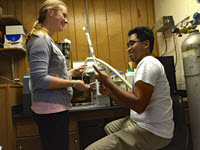
Oil is a complex mixture of chemicals with different degradation behaviors and toxicity levels. Understanding how the compounds in spilled oil, particularly toxic compounds, change with weathering is important to predicting oil’s persistence in the environment. Meredith Evans Seeley analyzed how oil compounds are preserved or removed over time in coastal systems that have different hydrographic activity levels. Her research will help determine which coastal environments are more likely to retain toxic compounds and require more attention from responders.
Meredith was a master’s student with The University of Texas at Austin’s Marine Science Institute and a GoMRI Scholar with the Dispersion Research on Oil: Physics and Plankton Studies (DROPPS I & II) consortium.
Her Path
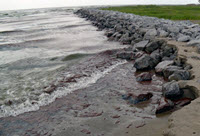
Meredith grew up on the Texas Gulf Coast and loved learning how different systems work in her science classes. She discovered an interest in marine science during a scuba diving trip with her older brother. The ocean and coral reefs they visited were unlike anything she had ever seen, and she wanted to learn everything about the marine world.
As an undergraduate at the University of Oklahoma, Meredith worked in a lab investigating invasive aquatic species and was able to travel the country conducting coastal restoration projects. After completing a biology bachelor’s degree, she knew she wanted to study threats to ocean health, so she applied for and entered the master’s program in marine science at the University of Texas at Austin. There, she worked in Dr. Zhanfei Liu’s lab researching Deepwater Horizon oil’s chemical evolution in coastal Louisiana for the DROPPS consortium.
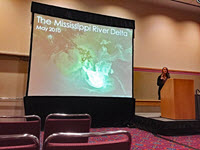
“I’ve always been most motivated by what makes logical sense to me. The oceans play a critical role in the functionality of our climate, so logically we should preserve the integrity of the oceans as best we can,” said Meredith. “Truthfully, though, I am also a very empathetic person. When I see that species and ecosystems are at risk, I really sympathize and want to help fix the problem. These fit together to make me keenly interested in understanding threats such as oil spills and protecting the Gulf for future generations.”
Her Work
Meredith initially focused on the weathering of petroleum hydrocarbons in oil-soaked sand patties, tar, and oil sheens collected from three different coastal environments: a high-energy beach front, a low-energy sandy inlet, and a very-low-energy back-barrier marsh. She measured the concentrations of individual oil compounds, including n-alkanes, polycyclic aromatic hydrocarbons (PAHs) and alkylated PAHs, in samples using gas chromatography (GC).
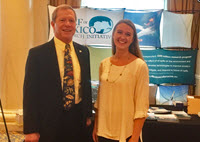
She observed that the magnitude of hydrocarbon depletion was most influenced by the environment’s hydrographic activity, with high-energy environments exhibiting significantly higher hydrocarbon depletion than lower-energy environments. The very-low-energy marsh environment consistently exhibited high concentrations of the same chemicals that experienced depletion in other environments over time, suggesting that oil compounds from sources other than the Deepwater Horizon incident accumulated into patties, tars, and sediments. Her results suggest that oil chemicals may be preserved for longer time periods in low-energy marsh environments than in high-energy environments, potentially threatening marine organisms and coastal ecosystem health.
“This research can be used to prioritize the type of shorelines we protect in future oil spills based on how likely they are to retain toxic compounds over time,” said Meredith. “However, it is important to recognize that petroleum is a very complex mixture, and traditional analysis techniques can identify only about 25% of compounds in Deepwater Horizon crude oil.”
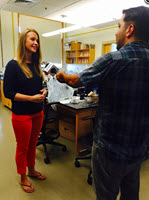
Meredith turned her focus to utilizing a unique analysis technique called ramped pyrolysis-gas chromatography-mass spectrometry (Py-GC-MS) to improve traditional hydrocarbon analysis. Py-GC-MS uses high-temperature pyrolysis to extract compounds within different temperature ranges from samples right before GC analysis without any sample preparation. “With this technique, we can achieve the same traditional analysis results while also gaining insight into high-molecular-weight or polar compounds that are difficult to identify,” she said. “In particular, we can use the oxygen output in the high-temperature zone (>370 °C) to estimate concentrations of oxygenated hydrocarbons, which previous studies suggest might be more bioavailable to marine species.”
Her Learning
Dr. Liu taught Meredith many scientific principles, but she was most influenced by his belief that one must always address “what’s new?” and formulate research questions to yield results that add something to the scientific community. Networking with other researchers at conferences and annual GoMRI meetings pushed Meredith to think about her research in new ways to present her work effectively. “Conferences motivated me to talk with scientists outside of my usual circle so that I could broaden my research goals and ideas through collaboration,” she said. “These connections and experiences, as well as learning under Dr. Liu, afforded me many benefits that I still reap today.”
Her Future
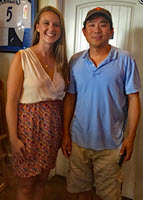
Meredith is currently a Ph.D. student at the Virginia Institute of Marine Science researching microplastic pollution. During her DROPPS research, she became curious about using Py-GC-MS to study microplastic polymers and found that there are many similarities between plastic and petroleum pollutants, including complex environmental fates.
She says it is important for students who are pursuing science not to be shy. Rather than feeling intimidated or being afraid to ask questions, she found that the best way to learn and grow as a scientist is to ask about potential opportunities. “The scientific community is the most supportive working environment I could imagine. Don’t be too timid to make those connections by asking to collaborate or just asking for help,” she said. “If you try to get involved with research that excites you, I guarantee someone will help you get there.”
Praise for Meredith
Dr. Liu described Meredith as one of the top graduate students he has ever worked with and praised her organization, communication, and research skills. Liu highlighted Meredith’s ability to communicate complicated data in simple language, which he finds to be a rare skill among early-stage graduate students. He believes these skills contributed to her winning the James D. Watkins Award for Excellence in Research during the 2016 Gulf of Mexico Oil Spill and Ecosystem Science conference and her invitation to present a GoMRI webinar the same year.
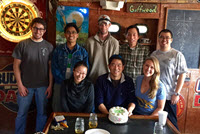
Liu said Meredith made significant contributions to the university’s broader community impacts when she worked with a K-12 program at Port Aransas Elementary School. He also praised her work as a summer teaching assistant, noting that she organized his course’s entire lab component. “In her teaching experience, Meredith demonstrated superb skills in organization and great attention to detail, he said. “She clearly is one of the top TAs I have ever seen, and without her excellent work I would not have been able to do it!”
The GoMRI community embraces bright and dedicated students like Meredith Evans Seeley and their important contributions. The GoMRI Scholars Program recognizes graduate students whose work focuses on GoMRI-funded projects and builds community for the next generation of ocean science professionals. Visit the DROPPS website to learn more about their work.
************
The Gulf of Mexico Research Initiative (GoMRI) is a 10-year independent research program established to study the effect, and the potential associated impact, of hydrocarbon releases on the environment and public health, as well as to develop improved spill mitigation, oil detection, characterization and remediation technologies. An independent and academic 20-member Research Board makes the funding and research direction decisions to ensure the intellectual quality, effectiveness and academic independence of the GoMRI research. All research data, findings and publications will be made publicly available. The program was established through a $500 million financial commitment from BP. For more information, visit https://gulfresearchinitiative.org/.
© Copyright 2010-2018 Gulf of Mexico Research Initiative (GoMRI) – All Rights Reserved. Redistribution is encouraged with acknowledgement to the Gulf of Mexico Research Initiative (GoMRI). Please credit images and/or videos as done in each article. Questions? Contact web-content editor Nilde “Maggie” Dannreuther, Northern Gulf Institute, Mississippi State University (maggied@ngi.msstate.edu).
